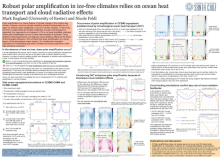Robust polar amplification in ice-free climates relies on ocean heat transport and cloud radiative effects
Nicole
Feldl
University of California, Santa Cruz
Poster
A fundamental divide exists between previous studies that conclude polar amplification does not occur without sea ice and studies that find polar amplification is an inherent feature of the atmosphere independent of sea ice. We hypothesize that a representation of climatological ocean heat transport is key for simulating polar amplification in ice-free climates. To investigate this we run a suite of targeted experiments in the slab ocean aquaplanet configuration of CESM2-CAM6 with different profiles of prescribed ocean heat transport, which are invariant under CO2 quadrupling. In simulations without climatological ocean heat transport, polar amplification does not occur. In contrast, in simulations with climatological ocean heat transport, robust polar amplification occurs in all seasons. We demonstrate that shortwave cloud radiative feedbacks can explain the divergent polar climate responses simulated by CESM2-CAM6. Targeted cloud locking experiments in the zero ocean heat transport simulations are able to reproduce the polar amplification of the realistic climatological ocean heat transport simulations, solely by prescribing high latitude cloud radiative feedbacks. We conclude that polar amplification inherently relies on an ocean-atmosphere coupling that facilitates amplified warming via a weak shortwave cloud radiative feedback. In addition to reconciling previous disparities, these results have important implications for interpreting past equable climates and climate projections under high emissions scenarios.

fildl-nicole-polar-poster.pdf
(1.13 MB)
